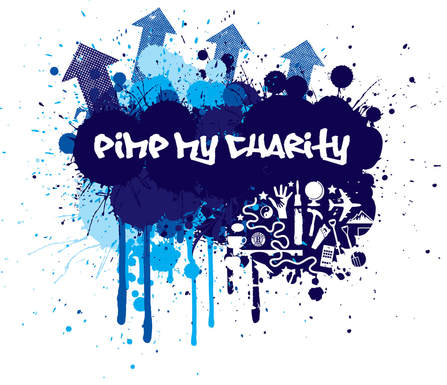 As a group we have a number of skills that could be of use to smaller charities that maybe only have a volunteer group to draw on. We all joined Rotary to make a difference, experience new things and develop ourselves personally, so we saw an opportunity to match our skill sets with these smaller organisations and offer them development. The plan is simple, charities contact us via our Pimp My Charity website with an idea of the help they need and we provide a free 3 hour session with the best suited people in the club. By the end of the session we will have provided new direction to that charity so they can breathe new life into their cause. If you know some groups that can benefit, or want to volunteer your skills, please have a look at the website - www.maidenheadbridgerotary.org.uk/pimpmycharity
0 Comments
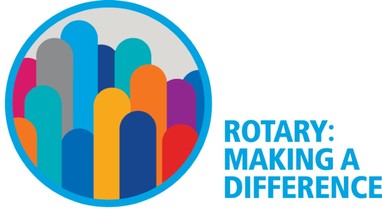 Some years ago, a new acquaintance asked me what should have been a simple question: “What is Rotary?” I opened my mouth to reply and then stopped short with the realization that I simply did not know where to begin. The problem wasn’t that I didn’t know what Rotary was. The problem was that Rotary was — and is — too large and complex to easily define. We are a member-based organization, a club-based organization, and a service based organization; we are local, regional, and international; we are community members, businesspeople and professionals, working and retired, active in nearly every country in the world. Every one of our 1.2 million members has a unique set of goals, experiences, and priorities; every one of us has a unique understanding of Rotary. To me, Rotary is defined not by who we are, but by what we do — by the potential that Rotary gives us, and the ways we realize that potential in meaningful and lasting service. Rotary has been around for a long time: 112 years. In some ways, we’ve changed tremendously, as we’ve grown, matured, and adapted to the changing needs of our members and communities. In our fundamentals, however, we remain the same: an organization of people with the desire — and through Rotary, the ability — to make a difference in our communities, and the world. We answer the question “What is Rotary?” with our actions, by making a difference through our service. As an organization, we recognize how important it is that the world understand what Rotary is, and what we do. At the same time, we know that it is more important than ever to allow our clubs to define Rotary service for themselves. As Rotarians, we have more flexibility than ever to decide how we want our clubs to meet, work, and grow. We’re focused more than ever on making sure that Rotary reflects the people it serves, with more women and a more diverse membership. And we’re working hard to ensure that Rotary remains the world’s pre-eminent volunteer service organization, by emphasizing long-term planning, sustainable service, and continuity in leadership on every level. In 2017-18, we will answer the question “What is Rotary?” with the theme Rotary: Making a Difference. However each of us chooses to serve, we do it because we know our service makes a difference in the lives of others. Whether we are building a new playground or a new school, improving medical care or sanitation, training conflict mediators or midwives, we know that the work we do will change people’s lives — in ways large and small — for the better. Whatever motivation each of us had for joining Rotary, it is the satisfaction we find in Rotary that causes us to remain, the satisfaction of knowing that week by week, year by year, we are part of Rotary: Making a Difference. Ian H.S. Riseley President, Rotary International, 2017-18 Be My Eyes makes life easier for people with a visual impairment by connecting them with sighted helpers through a smartphone app. It's a free mobile app designed to bring sight to blind and visually impaired people. With the press of a button on their mobile phone, the app establishes a live-video connection between blind and visually impaired users and sighted volunteers. For sighted people, it only takes a minute to choose the right tin from the shelf, or to check the expiration date on the milk, or find the right thing to eat in the fridge. For the visually impaired, small domestic tasks can be a big challenge. Be My Eyes is changing that! Every day, volunteers are lending their eyes to solve challenges both big and small in the lives of the blind and visually impaired. With over half a million users across 150 countries, Be My Eyes has grown to become the largest online community for the blind and visually impaired. Find out more here: http://bemyeyes.com/ How are people using Be My Eyes?There are many situations where a pair of friendly eyes can be helpful for those with visual impairment, and Be My Eyes is used to solve a wide range of daily tasks. No request is too big or too small! The following list provides examples of some of the creative ways people are using the Be My Eyes app:
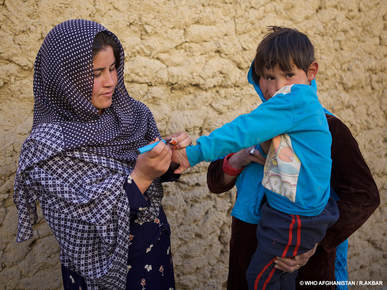 Rotary’s president in Great Britain and Ireland has welcomed the UK government’s £100 million cash boost towards the global battle against polio.Denis Spiller said he was proud that Rotary has been the catalyst for a worldwide campaign which, he believes, will help in the final push towards eliminating polio for good. International Development Secretary, Priti Patel, this morning (Friday) announced the multi-million pound commitment from the UK, which will be channelled through the World Health Organisation to implement programmes of the Global Polio Eradication Initiative. Mr Spiller said, “This huge pledge from the UK government helps close the funding gap to a point where the end is now truly affordable and in our grasp. Polio will very soon be confined to the history books.” Announcing the £100 million award, Ms Patel pointed out that the UK has been at the forefront of fighting global threats including polio. By making this push towards eradication by 2020, she predicted it will save 45 million children from contracting the disease. “Polio has no place in the 21st Century. This devastating and highly infectious disease causes painful paralysis and is incurable – trapping the world’s poorest people in a cycle of grinding poverty,” explained the International Development Secretary. “The world is closer than it ever has been to eradicating polio for good, but as long as just one case exists in the world, children everywhere are still at risk.” Only two months ago, during Rotary International’s Convention in Atlanta, global leaders recommitted to the importance of a polio-free world, and pledged financial support, totalling US$1.2 billion against the additional US$1.5 billion needed to finally eradicate polio. In Georgia, Bill Gates, who has been at the forefront of the polio campaign, addressed Rotarians urging them to continue their commitment. Through the “End Polio Now: Make History Today” campaign, every dollar Rotary contributes towards polio eradication is being matched two-to-one by the Bill & Melinda Gates Foundation – up to $50 million per year by 2020. Today the co-chair of the Bill & Melinda Gates Foundation thanked the generosity of the British public, saying that as a result children everywhere can live healthier, more prosperous lives and thrive in a polio-free world. Bill Gates said, “It’s fantastic to see such a generous pledge from the UK to the global effort to eradicate polio. With the steadfast commitment of key partners like the UK government and dedicated health care workers around the world, we are very close to ending polio forever.” Rotarians in Great Britain and Ireland have already contributed £30 million ($37 million) and pledged to support a global fund-raising goal of $50 million annually over the next three years.
Today’s announcement builds on the British government’s commitment in 2013 to spend £300 million on polio between 2013 and 2018. But even with the UK contribution, there is still a £128 million ($170 million) funding gap – and Ms Patel urged other nations to play their part in the fight. “Now it is time for others to step up, follow Britain’s lead and make polio history,” she added. Polio was wiped out in the UK in the 1980s and there are more than 100,000 British survivors today. Globally, the wild polio virus still exists in Afghanistan, Nigeria and Pakistan, with eight new cases this year. It is likely that the last new case of polio will be diagnosed this year, paving the way for the world to be certified polio-free by 2020. Britain has had a long-standing commitment to making polio the second human disease in history to be eradicated, after smallpox. As a direct result of the UK’s support to global efforts, which began in 1988, more than 16 million people are walking today who would have otherwise been paralysed. The number of people contracting the disease has been reduced by 99.9%. The UK government’s support will:
Rotary Purple4Polio ambassador, and Paralympian Ade Adepitan, who contracted polio as a baby, also welcomed the news. “We can see the finish line – and we can’t stop now,” he said. “The UK has always been a world leader. It can be part of our legacy to be at the forefront of the race to eradicate polio around the world. Let’s keep doing what we are doing and make the world a better place for future generations. “We are so close to eradicating polio. We need just one last push to make this disease history and change the world.” 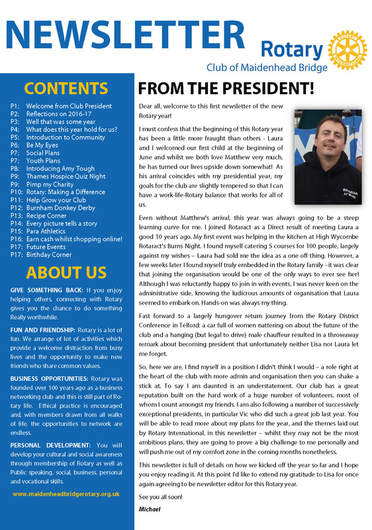 Dear all, welcome to this first newsletter of the new Rotary year! Seems like only yesterday we were sending out the first newsletter of 2016-17. In fact, it was exactly one year ago, and wow, what a year it has been for our wonderful club! Yet again this newsletter is packed full of interesting articles and updates on our amazing club. As it's the new Rotary year articles include a welcome from our new President, reflections on 2016-17, what we want to achieve in the next 12 months, as well as a special article on Amy Tough, the Rotary Youth Leadership Awards candidate our club has sponsored. To download the newsletter please click on the document below.
|
AuthorWrite something about yourself. No need to be fancy, just an overview. Archives
June 2024
Categories
All
|
||||||

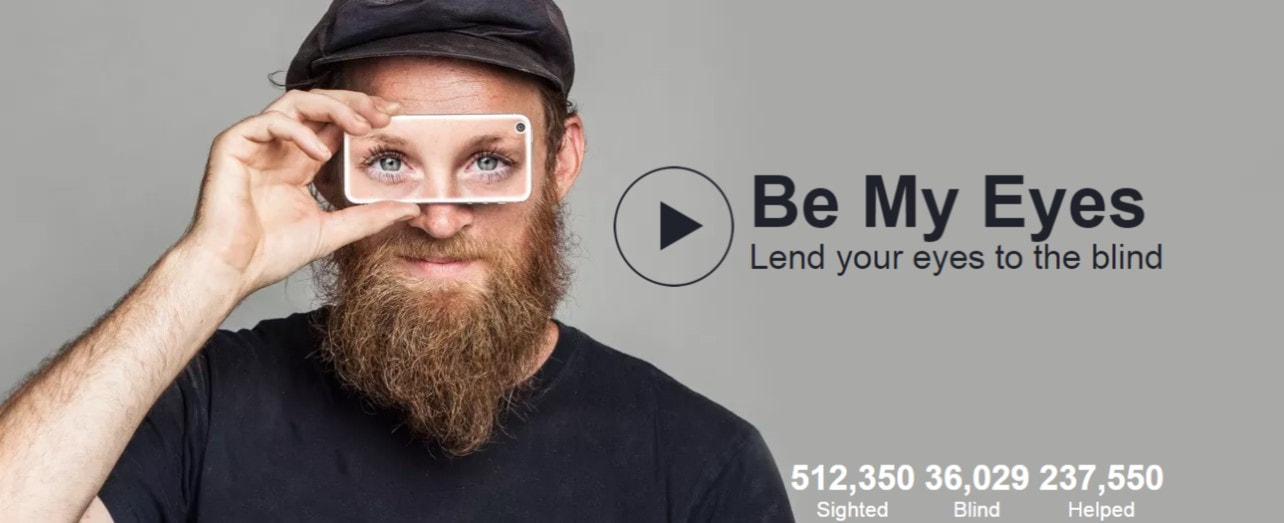
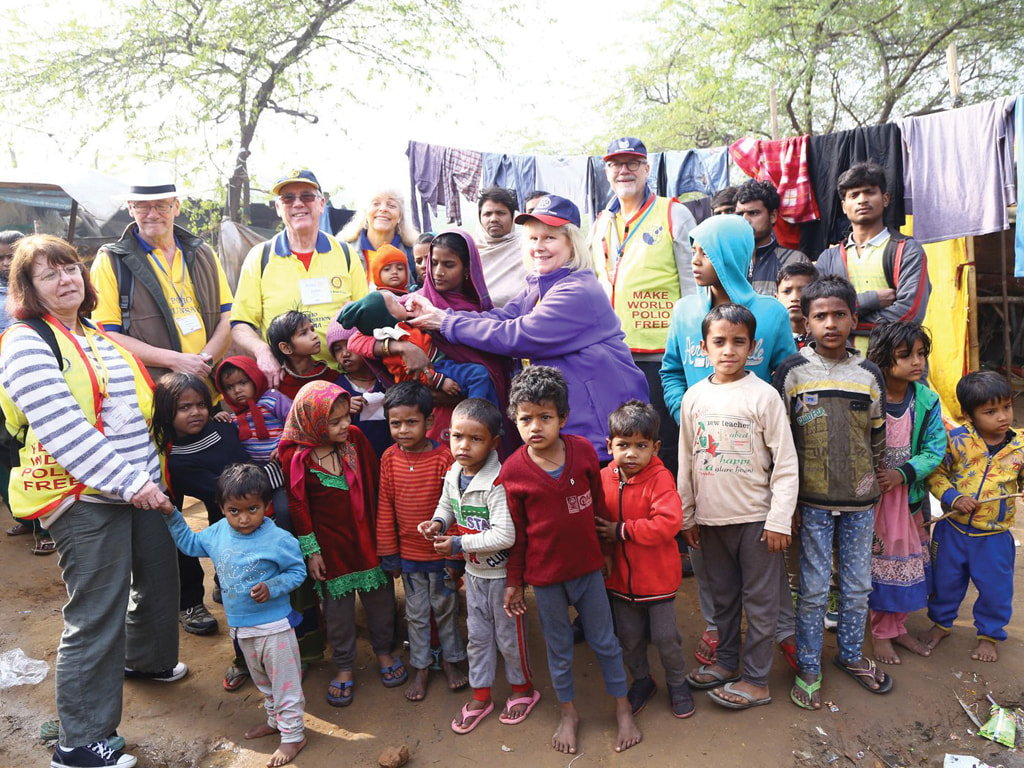
 RSS Feed
RSS Feed